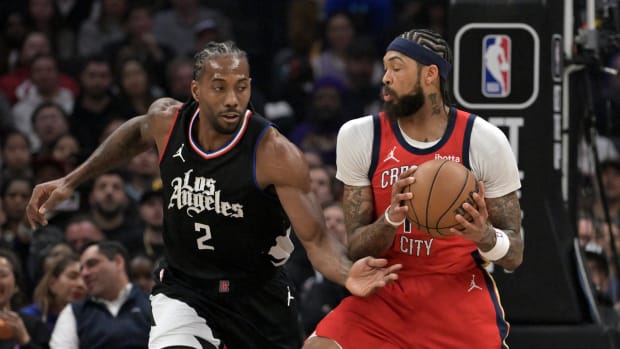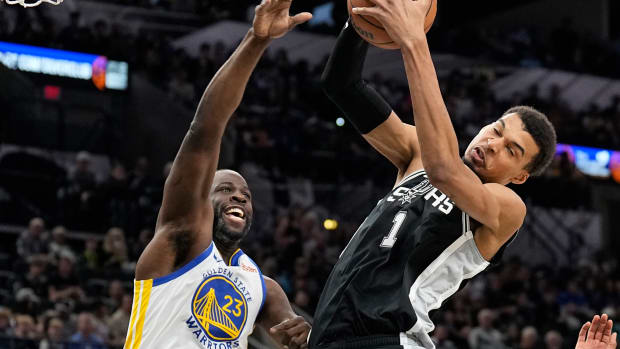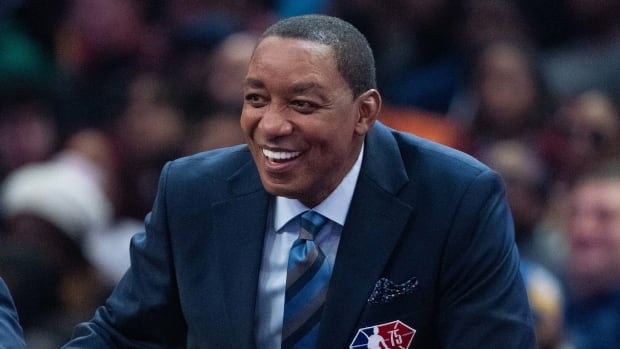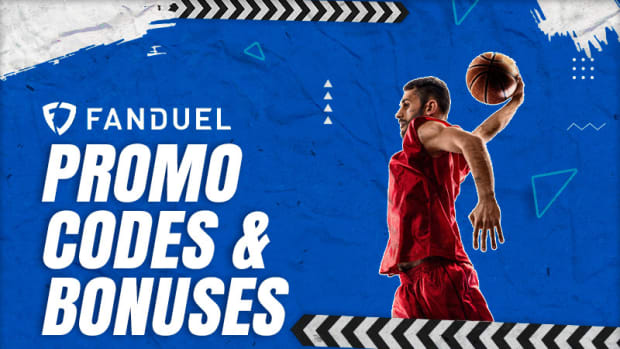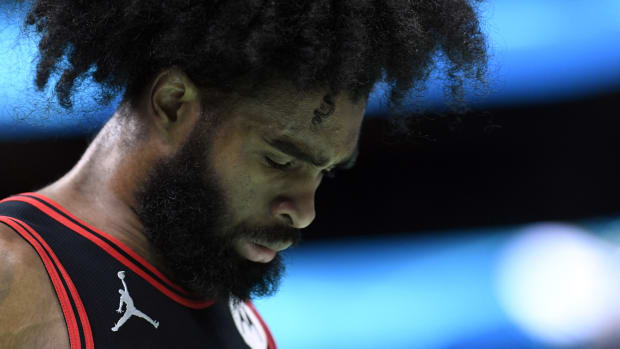'Not So Fast, My Friend.' Inside the Pelicans' Lucky Lottery Win
CHICAGO — There is a moment in the 20-seconds—the exactly-20 seconds—when the 14 ping pong balls are bouncing around the clear oval-shaped cylinder in the NBA draft lottery drawing room and the first ball is pulled that you can palpably feel the tension. And why not? Futures of franchises are literally at stake.
A quick primer on the draft lottery. The real draft lottery, not the televised special the league puts on after the drawing is done. In the basement of the Chicago Hilton, representatives of the 15 eligible teams—Boston and Philadelphia, vying for Sacramento’s pick, were in the room—sit behind two rows of tables. In front of them, Kiki VanDeWeghe, the NBA’s Executive Vice-President of Basketball Operations and emcee of this private event. To their left, eight boards, the “look up table” listing 1,001 possible combinations and the teams those combinations are committed to. The whole thing is filmed by the NBA and witnessed by a dozen reporters, all of whom are required to leave their cell phones, Apple watches, anything that can connect to the outside world outside the room.
(A piece of advice for future journalists covering the drawing room: Don’t sit next to the Chicago Tribune’s KC Johnson, as I did. Johnson—the self-styled “Helen Thomas of the lottery,” having covered the event since 1974 (or at least it feels like it) likes to connect ping pong ball numbers to ex-Bulls players draft position … even if you don’t ask him to. No. 1: Derrick Rose. No. 2: Tyson Chandler. No. 4: Jerry Sloan. You get the idea.)
A little after 6:30, everyone is asked to be seated. The rules are explained, meticulously. The balls are dropped in the bin for 20 seconds. After 20 seconds, an official, reacting to time kept by another official, pulls the first ball. After another 20 seconds the next ball is pulled, until four are removed. Unlike the televised lottery, the drawing room operates in numerical order, first to fourth.
At 6:41, the drawing begins.
7 …
4 …
12 …
13 …
New Orleans
Alvin Gentry tried to follow the combinations, connecting them to the limited numbers the Pelicans had. New Orleans had a six percent chance of securing the top pick, which explained the expletive-laced roar Gentry let out when the Pelicans name was called. What a year this has been for Gentry. A season that began with the promise of building on last spring’s second-round playoff run was scuttled at midseason when the team’s franchise player, Anthony Davis, requested a trade. Faced with the likelihood of trading Davis this summer, Gentry and the Pelicans were looking at an uncertain future.
Theoretically, everything that happens in the drawing room is off the record—unless team officials, with the league’s blessing, say it can be on the record. After high fiving representatives from other teams, Gentry made a beeline towards the media—and he was ready to talk.
He pointed to his tie, a black-and-white Zegna that Pelicans top exec David Griffin gifted to him, a gift to Griffin from Jeff Cohen, the Cavaliers minority owner who won two lotteries wearing the same tie years earlier. “This tie will never see this room again,” Gentry said. He flashed his notepad, with the words THIS IS OUR MOMENT! written at the top. He reported that Griffin brought his grandmother’s class ring for good luck while team PR man Matt Ryan brought with him a 57-year old wooden angel. He said Griffin had been predicting the Pelicans would win the lottery since the first meeting after Griffin’s introductory press conference, going as far as scouting local restaurants for the celebratory after party.
Asked about the impact the pick would have on Davis and his desire to be relocated, Genty smiled. “It will give him reason to pause.”
5 …
7 …
10 …
12 …
Memphis
In 2017, the NBA Board of Governors, faced with pressure to address the league’s tanking problem, approved changes to the draft lottery system. The new system leveled the odds for the teams with the three worst regular season records, giving each a 14% chance to secure No. 1. The odds for the remaining lottery participants would be reduced gradually after the top-three. The hope was that with less incentive to tank, fewer teams would.
Did it work? That’s debatable. But Memphis was among the league’s non-tankers this year. The Grizzlies shipped out Marc Gasol at midseason, formally ending the Grit ‘n Grind era and beginning a long overdue rebuild. But Memphis owed Boston a first-round pick from the ill-fated 2015 trade for Jeff Green, a top-eight protected choice the Grizz were desperate to convey this year. The Celtics, meanwhile, were equally eager for Memphis to keep it.
They didn’t, but it’s doubtful anyone in Memphis was complaining. In landing the No. 2 pick, the Grizzlies have a chance to add a second cornerstone player to a suddenly intriguing young roster. Jaren Jackson, the No. 4 pick last June, showcased stretch-five potential in 58 games last season. Ja Morant—the Russell Westbrooky point guard from Murray State—is widely considered a consensus No. 2 pick, freeing Memphis to explore trades for Mike Conley, the franchise stalwart who rebounded from an injury-plagued 2017-18 season to average 21.1 points in 70 games in ’18-19.
At 31, Conley is a valuable commodity. And let’s face it: Just like Gasol, who is headed to the conference finals with Toronto, Conley deserves a chance to play for a winner. Hopefully the Grizz accommodate him.
3 …
1 …
2 …
5 …
New York
Allan Houston, the ex-Knicks guard, current assistant GM and designated representative in the drawing room, stared straight ahead, a blank expression on his face. So much was riding on this drawing for New York. The Knicks tanked away the ’18-19 season, dumping former franchise cornerstone Kristaps Porzingis in February for draft picks and spare parts, mailing in game after game with one goal: Zion Williamson, the franchise savior, who would either lead the Knicks into a new era or serve as the primary trade chip in a deal that would unite Anthony Davis with free agent signees Kevin Durant and Kyrie Irving.
In the end, the result was positively Knicks-ey. New York secured a top-three pick, which could be RJ Barrett, might be Jarrett Culver but most definitely won’t be Zion. The prayers of so many New Yorkers—the literal prayers of a rabbi, a priest, a miracle healer and medical medium, a shaman, a member of the Eckankar clergy and two witches, who all visited Madison Square Garden in recent days, per the New York Post—went unanswered.
Don’t expect much league-wide sympathy for the Knicks, who are once again embarked on a ‘We’re New York so come play for us’ campaign that maddens rival executives. The Knicks have experienced nearly two decades of futility, yet continue to operate like a team that believes a Broadway address will be enough to entice a top tier free agent to sign there. And it might—but the carrot of Zion Williamson won’t be there to entice them.
10 …
8 …
5 …
11 …
Memphis
Re-draw. But seriously: Party hard on Beale Street tonight.
11 …
9 …
7 …
13 …
Lakers
Rob Pelinka clasped his hands together, bowing his head. In 2017, Pelinka, LA’s embattled GM, was in the lottery room when the ping pong balls awarded the Lakers the No. 2 pick, a huge moment with LA faced with losing the pick if it fell outside the top-three. On Tuesday, there was Pelinka again, accepting a gift from the lottery gods, with the 37-win Lakers jumping up to the top-four.
The Lakers needed a win, and they got one. They needed another trade chip to dangle in front of New Orleans for Davis, and they got a big one. Griffin is keeping his Davis cards close to the vest—on Tuesday, Griffin reiterated his position that he hopes to convince Davis to stay—but unless Davis agrees to an extension, he’s going on the block. And the Lakers just became a more attractive trade partner.
They could keep the pick, too. Say what you want about Pelinka—and his role in assembling last season’s malfunctioning Lakers roster warrants criticism—but his drafts have gone well. Lonzo Ball has been a mixed bag, but Ball has All-Star potential, and now an assistant coach in Jason Kidd who knows what it’s like to be a 6-6 point guard with an untrustworthy jump shot. Pelinka has Kyle Kuzma and Josh Hart on his resume, too.
The Lakers had a good night. New Orleans had a better one. Memphis has reason to celebrate while Phoenix, Chicago and Atlanta have reason to cringe. The biggest losers didn’t land the highest picks, which will make more than a few NBA executives smile.
And the biggest smiles were from Gentry. As team officials huddled around the television to watch the drawing play out, Gentry narrated it. When former The Vertical writer Adrian Wojnarowski remarked on the telecast that the Lakers moving up could sweeten the pot in a Davis deal, Gentry muttered, “Not so fast, my friend.” When it became clear that the Pelicans would land in the top-four, Wojnarowski reminded viewers that Griffin’s top priority was to convince Davis to stay. Said Gentry, “Thank you!”
As the lottery show ended and the doors to the drawing room swung open, Gentry let loose one last laugh and said, “I feel good all over again.”






























